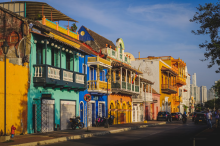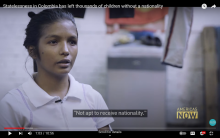“The Dominican Republic remains the most famous example of nationality stripping in the Americas in this new century.”
Beneco Enecia, General Coordinator Dominican@s por Derecho
KEY ISSUES
- The predominance of “birthright citizenship” (jus soli) generally provides a strong basis for preventing statelessness from arising, or being perpetuated from one generation to the next, in the Americas, but the issue still persists in the region.
- Deprivation of nationality, both on an individual and collective basis, has been a significant cause of statelessness in the Americas, with the situation in the Dominican Republic as the most notorious example.
- Other factors contributing to statelessness in the region include gender discriminatory nationality laws, deficiencies in the operation of some jus soli regimes, gaps in the registration and documentation of populations, and migration.
- Childhood statelessness is a particular risk in the context of the humanitarian crisis in Venezuela, which caused millions of people to leave the country: difficulties accessing documentation and consular assistance mean that children born outside Venezuela may struggle to have their nationality recognised or documented.
- Within global statelessness statistics, data on the Americas significantly underrepresents the scale of the issue because it does not account for people affected by statelessness in countries such as the Dominican Republic and the United States.
- The American Convention on Human Rights and the accompanying case law of the Inter-American Court and the work of the Inter-American Commission provide a robust legal framework for the protection of the right to a nationality in the region. The level of accession to the 1954 and 1961 Statelessness Conventions is also high in the Americas.
STATELESSNESS IN THE AMERICAS
Across the Americas region, legal frameworks generally provide for so-called “birthright citizenship”, granting nationality by virtue of birth on the territory (jus soli). This is a long-standing tradition, with South American jurisdictions for example influenced in this regard by the 1812 Spanish Constitution and the United States enacting unconditional jus soli through the adoption of the 14th amendment in 1868. The conferral of citizenship by descent (jus sanguinis), which is the dominant practice in other parts of the world, is also possible under the nationality laws of most countries in the Americas – although additional conditions apply in some cases where the child is born abroad.
The principle of birthright citizenship generally provides a strong basis for preventing statelessness from arising, or being perpetuated from one generation to the next, because it provides access to nationality to all persons born on a state’s territory regardless of the nationality - or statelessness - of their parents. Nevertheless, statelessness persists in the region. Individual and mass deprivation of nationality, gender discriminatory nationality laws, deficiencies in the operation of some jus soli regimes and gaps in the registration and documentation of populations, coupled with significant migration flows, all contribute to the emergence of new statelessness cases.
It is difficult to establish how many people are stateless in the Americas. At the end of 2023, UNHCR reported data accounting for just 7,348 stateless people in the region – of whom, the vast majority (5,222) were reported in Canada. This regional statistic does not, however, include those who are affected by statelessness in the Dominican Republic, where UNHCR stopped reporting data in 2015 but where other sources estimate that 137,794 continue to be affected by statelessness in the aftermath of mass deprivation of nationality in 2013. Nor does the data collated by UNHCR account for people who are affected by statelessness in the United States, where a mapping study published in 2020 estimated the number of people affected by or at risk of statelessness to be as many as 218,000 – a significantly higher figure than previously believed. Other data gaps include Haiti (where reporting was discontinued in 2018, but several thousand people were previously found to be stateless) and Venezuela (marked by an asterisk, denoting a significant statelessness issue but the lack of reliable data). As identification and mapping efforts continue, the official tally for the number of stateless persons in the Americas can be expected to rise significantly as it is clear from these examples that statelessness remains unreported or underreported in the region.
Over the past decade, a number of countries in the Americas have enacted legislative reforms aiming to enhance the identification and protection of stateless individuals, including through the establishment of statelessness determination procedures. Indeed, it is the region where accession to the statelessness conventions and the adoption of statelessness protection frameworks has seen the most significant progress in the decade since 2014 – when not only did UNHCR launch its global #IBelong campaign to end statelessness, but the Brazil Declaration and Plan of Action was adopted, which included a chapter on statelessness.
DEPRIVATION OF NATIONALITY
There are constitutional protections against deprivation of nationality in many countries in the region. Nevertheless, deprivation of nationality, both on an individual and collective basis, has been a significant cause of statelessness in the Americas. The situation in the Dominican Republic offers the most notorious example. Large-scale statelessness has been caused by the denial and deprivation of nationality for Dominicans of foreign (mainly Haitian) ancestry through the discriminatory 2013 Constitutional Court decision known as “La Sentencia”. The ruling affected people born in the Dominican Republic retroactively to 1929, without reviewing whether these people had nationality elsewhere, causing over 130,000 people to be stripped of their Dominican citizenship. The subsequent adoption of Naturalisation Law 169-14, in 2014, aimed to remedy the effects of the 2013 ruling, but no one who had previously not been in possession of Dominican papers have been naturalised under the route provided for in Law 169-14. The Dominican Republic continues to be home to a significant number of stateless people and people at risk of statelessness as a result, who face multiple obstacles in accessing basic rights.
In February 2023, the government of Nicaragua revoked the citizenship of 222 Nicaraguan political detainees, who were subsequently "expelled" to the United States. This crackdown on supposed dissent, another manifestation of Ortega’s authoritarian rule, has resulted in statelessness and a lack of access to basic human rights. Among those targeted are prominent writers, activists and journalists. Family members still in Nicaragua are seeking family reunification as they received threats by national authorities and encountered barriers when asking for passports needed to leave the country. Later the same month, the Managua Court of Appeals rendered a judgment pertaining to the stripping of Nicaraguan citizenship, political rights, and property from a further 94 individuals identified as political opponents, all done without a fair trial, and purportedly under the provisions of Law 1145, which addresses the loss of nationality.
In the United States, an in depth study into policy, practice and rhetoric around citizenship, published in late 2019 under the title “Unmaking Americans”, uncovered an increase in the use of denaturalisation by way of revocation of U.S. citizenship acquired through naturalization, as well as the denial and revocation of U.S. passports among both naturalized citizens and citizens by birth alike. This occurred against a wider backdrop of political attacks on citizenship by birth in the form of “policy proposals and surrounding rhetoric regarding the status of children born in the United States to non-citizens”. The report also concluded that this operation selectively targeting people on the basis of national origin, laying bare a pattern of discrimination against minorities. In Canada on the other hand, legal provisions that gave the government greater power to revoke citizenship from people convicted of crimes such as terrorism – introduced following a 2014 terrorist incident in Africa in which Canadian citizens were implicated – were repealed in 2017. Then Prime Ministerial candidate Justin Trudeau made it a central focus of his electoral campaign to repeal parts of the Strengthening Canadian Citizenship Act, arguing that the law created two classes of citizens. Memorably proclaiming that “a Canadian is a Canadian is a Canadian”, Trudeau argued that the citizenship of every Canadian is devalued when it is made conditional for anyone.
CHILDHOOD STATELESSNESS
The principle of “birthright citizenship”, or jus soli, is often referred to as an effective means of fulfilling the right to nationality, leading some to comment that the Americas is well positioned to lead the way in eradicating statelessness. However, a study that looked more closely at the operation of the nationality laws of Brazil, Chile, and Colombia concluded that “even facially generous jus soli provisions are only as effective as their implementation, and do not guarantee nationality to everyone”. The research uncovered how children face significant barriers in accessing nationality and may end up stateless as a result of exceptions to, or conditions for, the enjoyment of jus soli citizenship; other policy shortcomings; administrative deficiencies and obstacles to birth registration. Legal counselling and strategic litigation have proven to be important techniques to break down these barriers and assert the right of every child to a nationality – as shown by the experience in Chile, where such work eventually led to a government commitment to ensure that children were not missing out on citizenship.
Positively, several states have passed legislation to reduce the incidence of childhood statelessness. On 25 May 2020, the Bahamas ruled that children born out of wedlock to Bahamian men and foreign women are citizens at birth and no longer need to wait until they are 18 to apply for citizenship. This ruling benefits tens of thousands of people in the Bahamas, confirming that every person born in the Bahamas is a citizen at the time of their birth, if either parent is a citizen. The Privy Council, the highest court of appeal, upheld the ruling, which has yet to be incorporated into existing citizenship legislation to bring it in line with this development.
Canada has ended the practice of discrimination in the rights of same-sex parents to confer nationality. The Immigration Minister announced in July 2020 that either parent of a child born abroad, regardless of genetic link, could pass down Canadian citizenship. The United States has similarly removed the requirement of a biological connection for a parent to confer citizenship, ending discrimination against same-sex parents. The U.S. also passed the Adoptee Citizenship Act of 2021 that closes the legal loophole in the 2000 Child Citizenship Act, under which children adopted from foreign states and raised by U.S. parents may face barriers when acquiring citizenship, resulting in thousands of intercountry adoptees being denied their U.S. citizenship because they were born in foreign countries and then adopted in the U.S. In 2021, the U.S. Citizenship and Immigration Services also announced that children born overseas using assisted reproductive technology to unmarried couples where at least one parent is an American and one is related to the child, are eligible for citizenship.
STATELESSNESS IN A MIGRATORY CONTEXT
As in other regions, there is a distinct interaction between statelessness and migration in the Americas. For example, the issue of childhood statelessness became of renewed and urgent concern in the context of the humanitarian crisis in Venezuela, which caused millions of people to flee to other countries in the region. Given the reported challenges Venezuelan citizens have faced as a result of the crisis in acquiring documentation and accessing (functional) consular assistance abroad, the alarm was raised that children born outside Venezuela may struggle to have their nationality recognised or documented. Almost half of those who fled Venezuela have been taken in by neighbouring Colombia: over 2.8 million people have arrived from Venezuela since 2015 and tens of thousands of children have been born to Venezuelan parents on Colombian soil. This factor, combined with a restriction in the Colombian jus soli rules that would discount many of these children from birthright citizenship, prompted concern about the risk of a major new situation of childhood statelessness. Responding to domestic and international advocacy efforts around this issue, in August 2019, Colombian President Ivan Duque announced that Colombia would allow children born to Venezuelan refugees between August 2015 and August 2021 to receive Colombian nationality if they are born stateless or at risk of statelessness. This policy has subsequently been extended and in 2020, the Constitutional Court of Colombia also ruled that the evidentiary burden on parents to assert their children’s entitlement to Colombian nationality must be lowered. In September 2023, a new Nationality Law entered into force in Columbia, codifying the entitlement to citizenship for any child born in Colombian territory if they are recognised as stateless, but still subject to certain conditions relating to residence status.
Another situation in which the nexus between migration and nationality issues has emerged relates to Cuba, which has frequently rejected (re)entry to individuals who oppose the Cuban government. This situation compels these people to involuntarily remain in other countries, potentially leading to irregular immigration statuses. The Inter-American Commission on Human Rights documented this issue in its 2022 annual report, where it highlighted the severe violation of nationality-related rights resulting from the denial of individuals' right to return to their own country.
In some cases, people who were already stateless in their country of origin – outside the region – arrive in the Americas within mixed migration flows, as refugees, victims of human trafficking or migrants. The stateless community in the United States, for instance, encompasses a diverse range of immigrants, such as Rohingya, Bidoon, former Soviet Union citizens, Palestinians, and Kurds. In 2023, following a commitment in 2022, the Department of Homeland Security implemented crucial new guidance which provides a clear definition of statelessness and creates an assessment process for determining statelessness. This should help with the identification and response to cases of statelessness across a variety of immigration proceedings. A Bill that was introduced into Congress in December 2022, and would provide stateless people with protected status, green card eligibility, and a pathway to permanent citizenship, has yet to be passed. Numerous other countries in the region have adopted new legislation to introduce a statelessness protection framework over the course of the past decade.
REGIONAL STANDARDS AND COMMITMENTS
In the Americas, the established regional human rights system (the Inter-American system) is composed of two bodies: the Inter-American Commission on Human Rights (IACHR) and the Inter-American Court of Human Rights (IACtHR), created under the auspices of the Organisation of American States (OAS). Article 20 of the American Convention on Human Rights (ACHR) protects the right to a nationality. This provision, the accompanying case law of the Inter-American Court and the work of the Inter-American Commission provide a robust legal framework for the protection of the right to a nationality in the region.
Cases brought before the IACtHR, even if few in number, have reinforced guarantees against statelessness which establish limits to State discretion in this regard. Central among these was the ruling in 2005 in the case of Dilcia Yean and Violeta Bosico against the Dominican Republic. The court ruled that the denial of birth certificates to two girls born to Haitian migrant fathers and Dominican national mothers, despite the constitutional recognition of citizenship for all born in the country, was arbitrary and discriminatory. The court found a violation of Article 20 of the ACHR and also concluded that denying the girls nationality and leaving them stateless placed them in a “situation of extreme vulnerability” which led to other rights violations. In the subsequent case of Expelled Haitians and Dominicans v. Dominican Republic, the IACtHR affirmed that the failure to grant citizenship to otherwise stateless children born on the territory was an arbitrary denial of the right to nationality. The court has also dealt with cases relating to the deprivation of nationality, finding a violation of the ACHR in a case initiated by Ivcher Bronstein against Peru, because he was rendered stateless; but in a case brought by Raghda Habbal against Argentina, the court determined that there had not been a violation of the ACHR because Mrs Habbal was not at risk of statelessness and had sufficient access to judicial remedies.
In December 2023 the Inter-American Commission on Human Rights published a new Resolution on the right to nationality, prohibition of arbitrary deprivation of nationality and statelessness (Resolution 02/2023). The Resolution is intended to guide States, civil society organisations, international organisations and other relevant stakeholders in protecting the right to nationality, prohibiting arbitrary deprivation of nationality, and avoiding statelessness. The Resolution builds on a previous IACHR Resolution published in 2019 (04/19), that contains the Inter-American Principles on the Human Rights of Migrants, Refugees, Stateless Persons and Victims of Human Trafficking. Several resolutions of the OAS General Assembly have also urged states to take action against statelessness, including calling for the review national legislation to prevent and reduce statelessness, accessions to the statelessness conventions, and cooperation with UNHCR.
In 2014, the Brazil Declaration and Plan of Action was adopted by 28 countries and three territories in Latin America and the Caribbean. Within this, Chapter six is dedicated to statelessness and sets out several recommendations for action as part of an ‘eradicating statelessness program’, including (a) accession to the statelessness conventions, (b) the harmonisation of internal legislation and practice on nationality with international standards, (c) the establishment of effective statelessness status determination procedures and (d) the adoption of legal protection frameworks that guarantee the rights of stateless persons.
The level of accession to the 1954 and 1961 Statelessness Conventions is high in the Americas, with most countries in Latin America now being states parties to both conventions. At UNHCR’s High-Level Segment on Statelessness in October 2019, 10 countries from the region made pledges on issues concerning birth registration, statelessness determination procedures, awareness raising, conducting of studies, reduction of childhood statelessness, capacity building, and one pledge to amend the nationality law (Haiti). A number of states from the region also made pledges relating to statelessness during the December 2023 Global Refugee Forum. States in the Americas are also very active in making recommendations relating to nationality and statelessness within the Universal Periodic Review mechanism of the UN Human Rights Council.
[Last updated January 2024]
Cover image by Adrian Dascal @unsplash
Voices & Experiences
-
Uncertain Future for Stateless People in the U.S.
![Photo by Nauman Abdul Hafeez]()
Uncertain Future for Stateless People in the U.S.
![Photo by Nauman Abdul Hafeez]()
“Every stateless person has their own unique story about how they ended up in that situation, but geopolitical upheavals like the disbanding of the Soviet Union or crises like the war in Ukraine are common causes. Some have been left stateless because they were abroad at the time of a regime change in their home country and the newly formed state refused to recognise them as one of its citizens. Others became stateless when the autocratic governments of their home countries stripped all members of the ethnic or religious minority community they belong to of their citizenship. Whatever the cause, statelessness puts people in a bureaucratic limbo that robs them of the chance to lead a full life. As they do not have any travel documents, they often end up separated from their relatives in other countries for decades. Even if they demand to be “deported” no country agrees to take them so they cannot leave. Some may lack identity papers, work authorisation and even the ability to access healthcare. […] Stateless people in the US still have very few rights and their future in the country remains uncertain. Stateless people in the US demand concrete, immediate action from the government of their adopted home. The Biden administration should fulfil the promises it made to stateless people more than two years ago and urgently come up with a permanent and all-inclusive solution to statelessness in the country.”
Karina Ambartsoumian-Clough
Executive Director of United Stateless
-
Nationality stripping in the Dominican Republic
![DR]()
Nationality stripping in the Dominican Republic
![DR]()
“The Dominican Republic remains the most famous example of nationality stripping in the Americas in this new century”.
Beneco Enecia
Coordinator of the Dominican@s por Derecho (DxD) Platform
23 September 2023 marked the 10th anniversary of the Sentence 168-13 (“La Sentencia”) that denationalised at least 133,000 Dominicans, mainly of Haitian descent, in the Dominican Republic. Ten years on, thousands of people have not had their Dominican nationality effectively recognised, and continue to face daily threats, arbitrary detentions and possible expulsions from their own country. The Domincan@s por Derecho (DxD) Platform, a collective of different civil society organisations that promotes equal access and to all public services related to nationality, civil registration, and identity in the Dominican Republic, organised an event that sought to take stock of the status quo with a view to redoubling efforts towards lasting solutions. This involved strengthening and realising the right to Dominican nationality for those people in the Dominican Republic who hold this right under the Constitution when they were born.
Voice from https://drive.google.com/file/d/1YlnlenbLmoFAmyOHSDKhzdZgKb5OMLVK/view)
-
Statelessness in Colombia has left thousands of children without a nationality
![columbia]()
Latest Resources: Americas
-
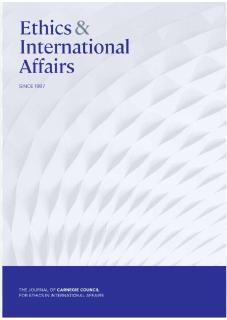
Heeding the Clarion Call in the Americas: The Quest to End Statelessness
Type of Resource: Academic publication
Theme: General / Other
Region: Americas
View -
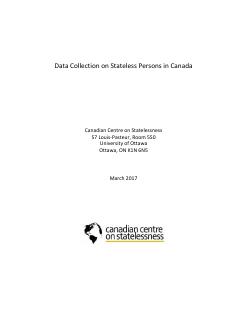
Data Collection on Stateless Persons in Canada
Type of Resource: Report
Theme: Data / Statistics
Region: Americas
View -
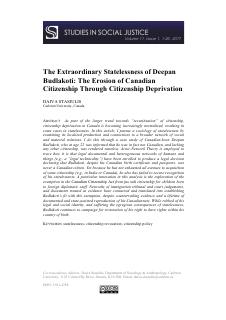
The Extraordinary Statelessness of Deepan Budlakoti: The Erosion of Canadian Citizenship Through Citizenship Deprivation
Type of Resource: Academic publication
Theme: Nationality Deprivation
Region: Americas
View


